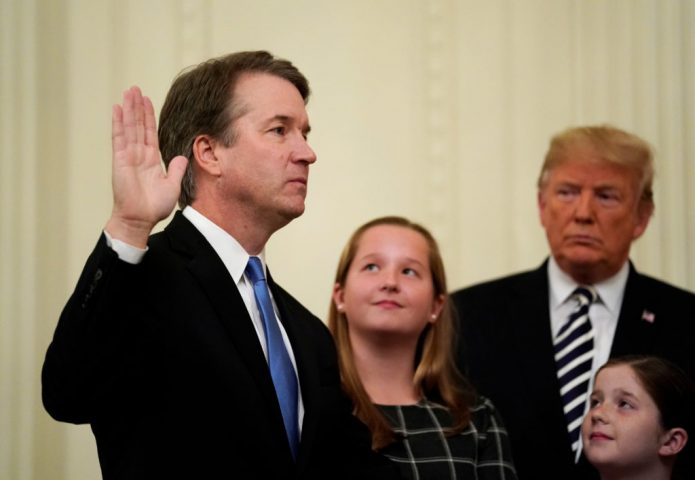Crisis Magazine: Church Scandal Through the Eyes of St. Thomas More
October 13, 2018Msgr. Charles Pope: Go with God, Cardinal Wuerl
October 13, 2018
By Rachel N. Busick, Washington Examiner, October 12, 2018
When Supreme Court Justices meet in conference Friday, Oct. 12, two states, Kansas and Louisiana, will eagerly be waiting to see whether the court will hear two abortion-related cases.
The cases were originally scheduled for the justices’ first conference of the term at the end of September, but have been rescheduled twice so far, presumably to wait for a ninth justice. With the addition of Justice Brett Kavanaugh on Monday, the Court may now have the fourth vote needed to take them up.
The cases are Andersen v. Planned Parenthood of Kansas and Mid-Missouri and Gee v. Planned Parenthood of Gulf Coast. They both ask the same question: Does the Medicaid Act allow individual patients to sue their state in federal court to ensure that they can receive Medicaid benefits from their preferred provider of choice, in these cases, Planned Parenthood? The answer to that question will determine whether states are forced to fund abortion providers under their Medicaid programs.
These cases represent the first chance Kavanaugh will have to weigh in on an issue affecting abortion. How the Supreme Court handles these cases with a 5-4 conservative majority will be a key indicator of how the new Court will engage on issues relating to abortion, including perhaps even whether the court might be open to revisiting Roe v. Wade in the future.
It is well-established that states, as well as the federal government, are not required to fund elective abortions. But it is far from settled whether states must fund abortion providers for other services that they provide.
Over the last several years, Planned Parenthood has come under increased public scrutiny and criticism for its dubious business practices. Undercover videos appeared to show Planned Parenthood officials haggling over the body parts of aborted fetuses, and there have been multiple reports alleging massive fraud, waste, and abuse and unsafe practices of Planned Parenthood affiliates. As a result, the defunding of Planned Parenthood and other abortion providers became a priority for many states.
The federal government has also gotten in on the act. For example, earlier this year the U.S. Department of Health and Human Services proposed a rule that to receive Title X family planning funds there must be clear financial and physical separation between a Title X funded project and abortion services. And just last week, the full 6th Circuit Court of Appeals heard oral arguments on whether Ohio can defund abortion providers under six of its federally funded health programs.
Perhaps most notably, there has been a wave of states seeking to defund abortion providers under their state Medicaid programs. HHS is currently reviewing proposals from Texas, Tennessee, and South Carolina, while the defunding decisions by other states — including Kansas and Louisiana — have been challenged in federal court by Planned Parenthood and some of its patients. Federal appeals courts have split on the issue.
On one side, the 8th Circuit upheld Arkansas’s right to terminate its Medicaid provider agreement with Planned Parenthood and to successfully curtail state taxpayer dollars to the abortion giant. The court explained that the Medicaid Act’s terms only allow individuals to choose a “qualified provider,” and under the Act, states are given not only great leeway to create their own state Medicaid programs, but also broad authority to determine whether providers are qualified to participate.
On the other side, the 5th, 6th, 7th, 9th, and 10th Circuits have all found that the Medicaid Act grants individual patients a right to receive care from any provider who is able and willing to perform the requested services, all on the state’s dime.
Kansas (in the 10th Circuit) and Louisiana (in the 5th Circuit) have now both asked the Supreme Court to hear their cases. Kansas chose to remove Planned Parenthood of Kansas and Mid-Missouri as a qualified Medicaid provider in the state after the abortion provider refused to allow the Kansas Department of Health and Environment to complete an inspection and photograph portions of its facility as required under state law.
Louisiana disqualified Planned Parenthood of Gulf Coast after it failed to report several Medicaid fraud lawsuits that had been filed against it, as well as a settlement in which Planned Parenthood, despite disclaiming all liability, paid back over $4.3 million to federal and state Medicaid programs.
Medicaid funds are vital to many women, and states should be free to decide where their Medicaid dollars are best spent to serve women and their citizens. The states in these two cases determined that giving Planned Parenthood state Medicaid funds was not a wise use of their limited resources, and that they could better serve their citizens by reallocating those funds to other comprehensive and preventive health organizations that are run more responsibly and offer a broader range of services.
Without intervention by the Supreme Court, states like Kansas and Louisiana will be forced to continue to provide tax dollars to the nation’s largest abortion business.
With Friday’s conference, the court could announce as early as next week whether or not it will hear the case this term. If the answer is yes, and Kansas and Louisiana get their day in the Supreme Court, the country will get its first look at how the new court will approach abortion.
Rachel N. Busick is staff counsel at Americans United for Life.







